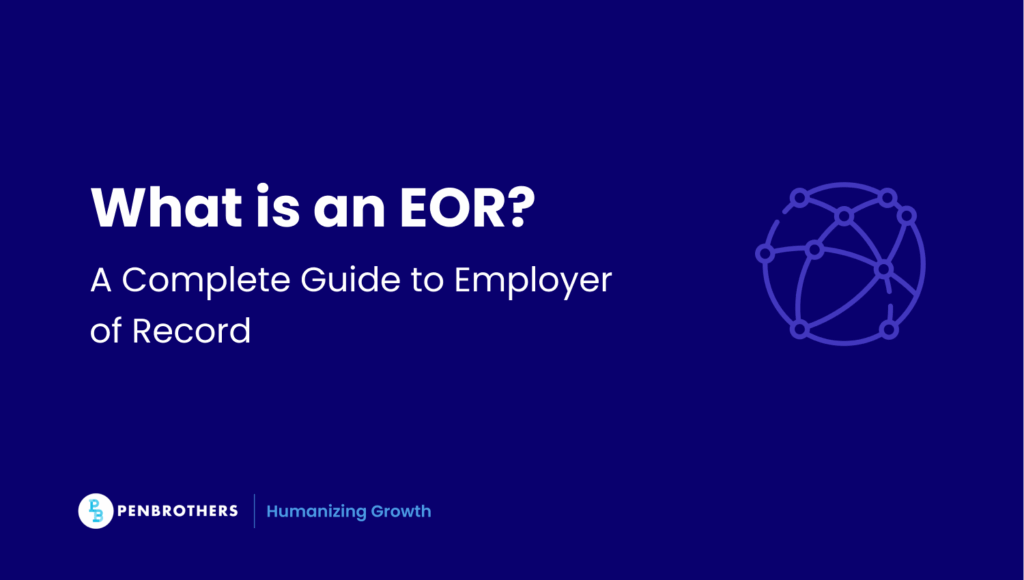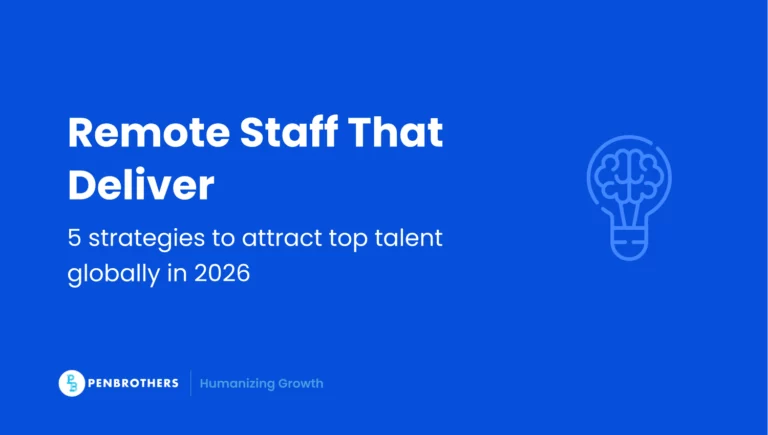Expanding internationally is exciting. It’s also complex. Hiring across borders comes with legal, administrative, and compliance challenges.
An Employer of Record (EOR) helps businesses navigate these complexities, making global hiring seamless. Companies no longer need to set up legal entities in multiple countries. Instead, they can hire and manage talent compliantly with the right EOR partner.
This guide explores what an EOR is, how it differs from other employment models, and why it’s a game-changer for businesses looking to scale globally.
Key Takeaways
- A Legal Shortcut to Global Hiring: An Employer of Record (EOR) acts as the full legal employer for a company’s international workforce. This allows a business to hire talent in other countries without needing to establish its own foreign legal entity.
- Handles All Local HR and Compliance Burdens: The EOR’s primary function is to assume all legal employer responsibilities, including managing payroll, tax compliance, employee benefits, and adherence to local labor laws, thereby mitigating risk for the client company.
- Fundamentally Different from a Domestic PEO: It is critical to distinguish an EOR from a standard PEO. An EOR is the sole legal employer (no client entity needed), while a PEO (Professional Employer Organization) operates in a co-employment model, sharing legal liability with the client, which must have a registered entity in that location.
- Enables Faster Market Entry and Access to Talent: The main strategic benefits of using an EOR are speed and agility. It allows a company to enter a new international market and hire talent in weeks instead of the months required for legal setup, providing a fast and compliant way to access the global talent pool.
What is an Employer of Record (EOR)?
An Employer of Record (EOR) is a third-party organization that legally employs workers on behalf of a company.
Key Responsibilities of an Employer of Record:
- Hiring and onboarding international employees.
- Managing payroll, benefits, and tax compliance.
- Ensuring adherence to local labor laws and regulations.
- Handling employment contracts and terminations.
- Providing HR support and risk mitigation.
Who Needs an Employer of Record?
- Startups & Scaleups: Expanding into new markets without setting up legal entities.
- HR & Talent Acquisition Teams: Hiring top talent internationally while ensuring compliance.
- Finance & Compliance Officers: Managing global payroll and mitigating tax risks.
- BPO & Offshoring Firms: Scaling teams in multiple locations efficiently.
- Remote-First Companies: Streamlining international workforce management.
EOR vs. PEO: Key Differences
Many businesses confuse an EOR (Employer of Record) with a PEO (Professional Employer Organization). While both help manage employment-related tasks, there are key differences.
| Feature | Employer of Record (EOR) | Professional Employer Organization (PEO) |
| Legal Responsibility | EOR assumes full employer liability. | Co-employment model (shared liability). |
| Entity Requirement | No need to establish a local entity. | Requires company registration in each country. |
| Payroll & Tax Compliance | Managed entirely by the EOR. | Handled jointly with the company. |
| HR & Benefits | Comprehensive HR support, including compliance. | Broader HR services but requires company involvement. |
Which One is Right for Your Business?
Choosing between an Employer of Record (EOR) and a Professional Employer Organization (PEO) depends on your company’s specific needs, structure, and expansion strategy. Understanding the key differences between these models can help you make an informed decision.
Choose EOR if:
- You need a fast, compliant, and hassle-free way to hire internationally without setting up a legal entity.
- Your business is testing new markets and you want a low-risk entry before committing to a full legal setup.
- You want a fully managed solution, where payroll, benefits, compliance, and HR administration are taken care of.
- You are a startup, scale-up, or an enterprise looking for flexibility in global hiring.
- Your business prefers to focus on core operations while outsourcing workforce management to experts.
Choose PEO if:
- Your company already has a legal entity in the country where you plan to hire employees.
- You need HR outsourcing but want to maintain a shared employer relationship with your workforce.
- Your business has an established presence in multiple regions and requires support in managing employee benefits, payroll, and HR compliance.
- You want to retain a level of operational control while outsourcing only specific HR functions.
- Your business is comfortable handling local tax and employment regulations, but needs additional administrative support.
Ultimately, an EOR is ideal for businesses seeking an agile and risk-free global hiring solution, while a PEO works best for companies that already have a local presence but need HR outsourcing support. Understanding your long-term hiring goals and compliance needs will guide your choice.
Benefits of Using an Employer of Record
1. Access to Global Talent
Hiring internationally opens doors to a diverse, skilled workforce. EORs allow businesses to recruit the best talent from anywhere without worrying about setting up a legal entity.
This is particularly beneficial for companies looking to diversify their workforce or enter new international markets. It enables access to specialized skill sets that may be scarce in the company’s home country. EORs also facilitate remote work adoption, ensuring compliance with different labor laws while providing competitive compensation and benefits to attract top talent.
According to the International Labour Organization (ILO), global unemployment remained at a historical low of 5% in 2024 and is projected to maintain this rate in 2025. However, youth unemployment is significantly higher at 12.6%, indicating a talent pool that remains underutilized.
2. Reduced Compliance Risks
Every country has unique labor laws, tax regulations, and employment rules. EORs ensure compliance, reducing the risk of fines, lawsuits, or legal complications.
Employment laws change frequently, and failing to comply can result in severe penalties and damage to a company’s reputation. EORs stay ahead of regulatory changes, ensuring businesses remain legally compliant. They handle employment classifications, tax filings, visa sponsorships, and benefits administration, reducing legal exposure and ensuring peace of mind for companies expanding into foreign markets.
The World Bank’s Business Ready (B-READY) project, which replaced the “Doing Business Report” in 2021, provides ongoing analysis of the business and investment climate, including labor regulations. Its data confirms that navigating foreign labor laws presents significant challenges for businesses, reinforcing the role of EORs as a crucial strategy for mitigating compliance risk.
3. Faster Market Entry
Setting up a foreign entity can take months, if not years. With an EOR, businesses can hire employees in new markets within weeks, avoiding bureaucratic delays.
Speed matters in global expansion. Companies that use EORs can enter markets quickly and efficiently, securing top talent before competitors do. This is particularly advantageous in industries with high demand for specialized skills, allowing companies to build teams in strategic locations without the hassle of incorporation, licensing, and local entity setup.
4. Streamlined Business Operations
EORs handle payroll, benefits, and HR tasks, allowing companies to focus on growth rather than administrative headaches.
By outsourcing payroll processing, tax compliance, and employee management, businesses free up valuable time and resources. HR teams can focus on strategy, employee engagement, and talent development, rather than getting bogged down by complex international employment regulations. Additionally, EORs provide one central platform for managing global teams, ensuring seamless operations across multiple locations. The ILO reports that labor’s share dropped from 52.9% in 2019 to 52.3% in 2022, highlighting growing wage inequality and the need for robust employment frameworks.
5. Cost Efficiency
Expanding into new countries can be expensive. By partnering with an EOR, companies avoid setup costs, legal fees, and administrative overhead.
Without an EOR, companies would need to establish legal entities, navigate foreign tax codes, and hire in-house HR and legal experts—all of which come with significant costs. EORs provide a cost-effective solution, eliminating the need for in-country legal entities while optimizing payroll and tax structures to reduce overall labor costs. This is especially beneficial for startups and mid-sized companies looking to scale efficiently without excessive overhead.
For insights into cost savings in offshoring, read our blog on cost savings through offshoring in the Philippines.
How to Select the Right Employer of Record Provider
Choosing the right EOR partner is critical for global hiring success. Consider these factors:
1. Industry Expertise
Not all EORs specialize in every industry. Choose one that understands your sector’s labor laws, compliance requirements, and unique hiring needs. A specialized EOR ensures proper regulatory adherence and avoids potential operational hiccups.
2. Global Coverage
Ensure the EOR operates in the countries where you plan to hire. A provider with extensive geographic reach is essential for multinational expansion. Check if they have experience managing workforces in your target locations and understand the nuances of regional labor laws.
3. Compliance & Risk Management
A good EOR should have strong legal and compliance teams to navigate local labor laws effectively. They should proactively monitor legislative updates, ensuring that your company remains compliant while mitigating risks associated with misclassification, tax laws, and employment policies.
4. Transparent Pricing & Contracts
Understand the fee structure upfront. Look for flexible contracts and clear service agreements to avoid hidden costs. A reputable EOR should be upfront about costs, with no surprise fees related to termination, compliance updates, or additional services.
5. Customer Support & HR Assistance
Having responsive HR and payroll support is crucial for employee satisfaction and compliance. Ensure that the EOR offers dedicated account managers, multilingual support, and 24/7 availability, especially when operating across multiple time zones.
Final Thoughts
Global hiring is no longer just for multinational giants. With an Employer of Record (EOR), businesses of all sizes can hire internationally, remain compliant, and scale efficiently.
Whether you’re a startup, a growing enterprise, or an established company, EOR services help streamline global workforce management.
If expanding your team beyond borders is your next move, choosing the right EOR partner can make all the difference. Are you ready to explore new markets? Let’s talk.
Frequently Asked Questions
An Employer of Record (EOR) is a third-party organization that acts as the full, legal employer for your employees in another country. It allows your company to hire talent internationally without having to set up a local legal entity.
An EOR’s primary responsibilities include managing all aspects of the employment lifecycle on your behalf. This includes handling international payroll processing, employee benefits administration, tax compliance, ensuring adherence to all local labor laws, and managing employment contracts and terminations.
The main difference is the employment model. An EOR is the sole legal employer and assumes full employer liability, which allows you to hire in a country where you have no legal entity. A PEO (Professional Employer Organization) is a co-employer, meaning it shares legal liability with your company, which must already have a registered legal entity in that country.
The biggest benefits are speed and compliance. It allows for faster market entry because you can hire talent in weeks instead of the months it takes to set up a legal entity. It also reduces compliance risks by having a local expert manage all the complex and varying international labor laws and tax regulations.
An EOR is ideal for any company that wants to hire employees in other countries without the cost and complexity of establishing a local entity. This makes it a popular solution for startups and scale-ups testing new markets, as well as for remote-first companies building a distributed global workforce.






